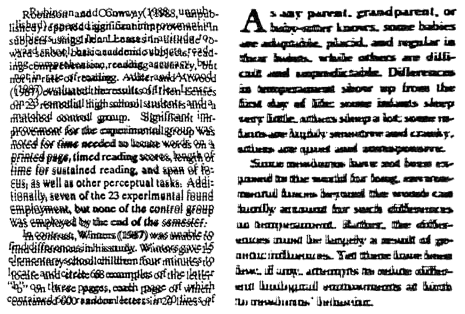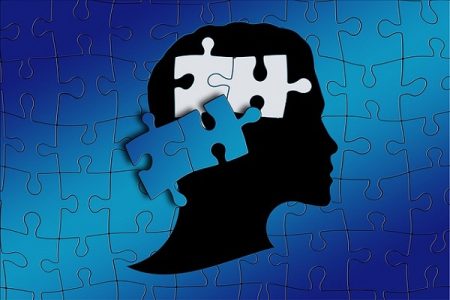What Do Words Look Like to a Dyslexic Person?
- Updated on: Jun 29, 2024
- 4 min Read
- Published on Feb 3, 2021

Dyslexia children find it difficult to form sentences and find the right words. Dyslexic people often face difficulties with reading, writing, spelling, information processing, memory issues, and direction confusion.
How Does a Dyslexic Person See Words?
A dyslexic person is very poor in reading and therefore suffers from many reading difficulties. The reason why dyslexic people have reading difficulties is that they experience a lot of visual pressure due to which they are not able to visualize the letters properly.
Most people with dyslexia see words in an inverted form (upside down) or half letters or moving letters. For example, dyslexic people find it difficult to differentiate between letters ‘d’, ‘p’ or ‘q. Some people suffer from significant reading problems due to visual pressure created.
Dyslexic people in most of the cases do not focus much on words; instead, they utilize all their senses and perceive messages in the form of pictures. Reading is extremely poor in people who have dyslexia due to their family history because they have been brought up in an environment where people have a poor vocabulary, and dislike for words, reading, and writing.
There are many problems found in people with dyslexia especially when it comes to identifying or seeing words, alphabets, and letters. Following are some of the main problems associated with dyslexic people when it comes to seeing or identifying letters:
Backward Letters
Children with dyslexia find it very difficult to see normal letters. Instead, they tend to see some letters backward or inverted (upside down).
Jumping of Words
Some dyslexic children reported that they see words, letters, and texts jumping around on a page.
Read More: Dyslexia in Adults
Read More: Dyslexia and Attention Deficit Hyperactivity Disorder
Difficulty in Differentiating Similar letters
Dyslexic people in most cases are unable to differentiate between letters that look-alike such as o, e, and c.
Difficulty in Recognizing Similar-Shaped Letters
People suffering from dyslexia cannot recognize the letters that are similar in shape but differ in their orientations, for example, b and p and d and q.
Jumbled Letters or words
Dyslexic people often see words in a jumbled form, out of order in a way that they all look bunched together without any order (see the figure below).
Backward Words
Some words recognized by dyslexics are in completely backward form of the actual word. For example, they can see the words like bird as drib, car as rac, pen as nep, etc. These words or letters may look fine while they are writing but when they attempt to read them, they may experience a severe headache or similar other health issues.
Inability to Connect Sounds
Dyslexics are not able to sound out the words and find it very difficult to connect the letters to the sounds that they make.
Some dyslexics, however, are able to connect the words to their sounds but fail to remember the words. They have to start fresh no matter how many times they have seen the words before.
Optical Illusions
Dyslexia people often fail to see the words or letters in their original form, instead, they see them inverted, half, backward, mixed up, jumbled, moving, and blur. The reason is that their brain is unable to perceive the real form of the words which in turn leads to optical illusions.
Below is an example of how words or sentences appear to people with dyslexia.

(Image Credit: Wikimedia Commons)
The picture indicates that the words are very unclear, jumbled, and messed up when seen by a dyslexic child.
Why Do Dyslexics Have Spelling Difficulties? What Causes It?
Some people with dyslexia find it extremely difficult to spell words correctly. However, there is less research about the spelling issues faced by dyslexics compared to reading and writing problems. There is also no specific national test for diagnosing spelling issues in dyslexia people, which is why many states ignore the spelling errors of dyslexics.
Almost all people with dyslexia face spelling issues besides reading and writing problems. Some people with dyslexia do fairly well in writing and reading after persistent efforts by their teachers and other individuals involved. However, the spelling and writing errors continue lifelong and require task modifications, continuous instructions, accommodations from their teachers.
It is often thought that the poor spelling in dyslexics is caused due to poor memory related to the identification and sequencing of letters in words. However, research suggests that poor visual memory plays a minor role in the inability to spell words correctly. Therefore spelling problems are due to difficulty or weakness in language learning. It has been found that the basic cause of spelling errors of confusing words like wnet for went and letters like b, p, q is due to weakness in language learning rather than poor visual memory.
FAQs
Do Dyslexics See Words Backwards?
Dyslexic people face many problems in recognizing the words, writing the words, differentiating similar words, and even writing the words properly. Mirror or reverse writing is a symptom of dyslexia but till now there is no strong evidence that dyslexics actually see letters and words backward.
What are Dyslexics Good at?
It is not necessary that people with dyslexia are not intelligent or smart just because they cannot write and read properly. Some dyslexics are very smart and intelligent and have many good and advantageous qualities that enable them to think about ideas that are out of the box. Some dyslexics have been found to be very good in using logical reasoning.
What Do Dyslexic See When They Read?
Dyslexics often experience a lot of visual pressure due to which they see letters or words in jumbled, reversed or mixed form. But this is not true with all dyslexics because there are many types of dyslexia and each type has one or other problems in their reading and writing skills.
Was Einstein Dyslexic?
Yes, the most influential physicist of the 20th century, Albert Einstein, was dyslexic. He hadn’t any problems with numbers and liked science and mathematics but he was very poor in spelling the words and had grammar problems also.
Is Writing Backwards a Sign of Dyslexia?
Writing backward is not always a sign of dyslexia especially in children who are below the age of 7 years because it is very common for kids to reverse the letters especially when they are at the beginning stages of writing. Children who are above the age of 7 years and are still reversing the letters may be dyslexic in some cases.












